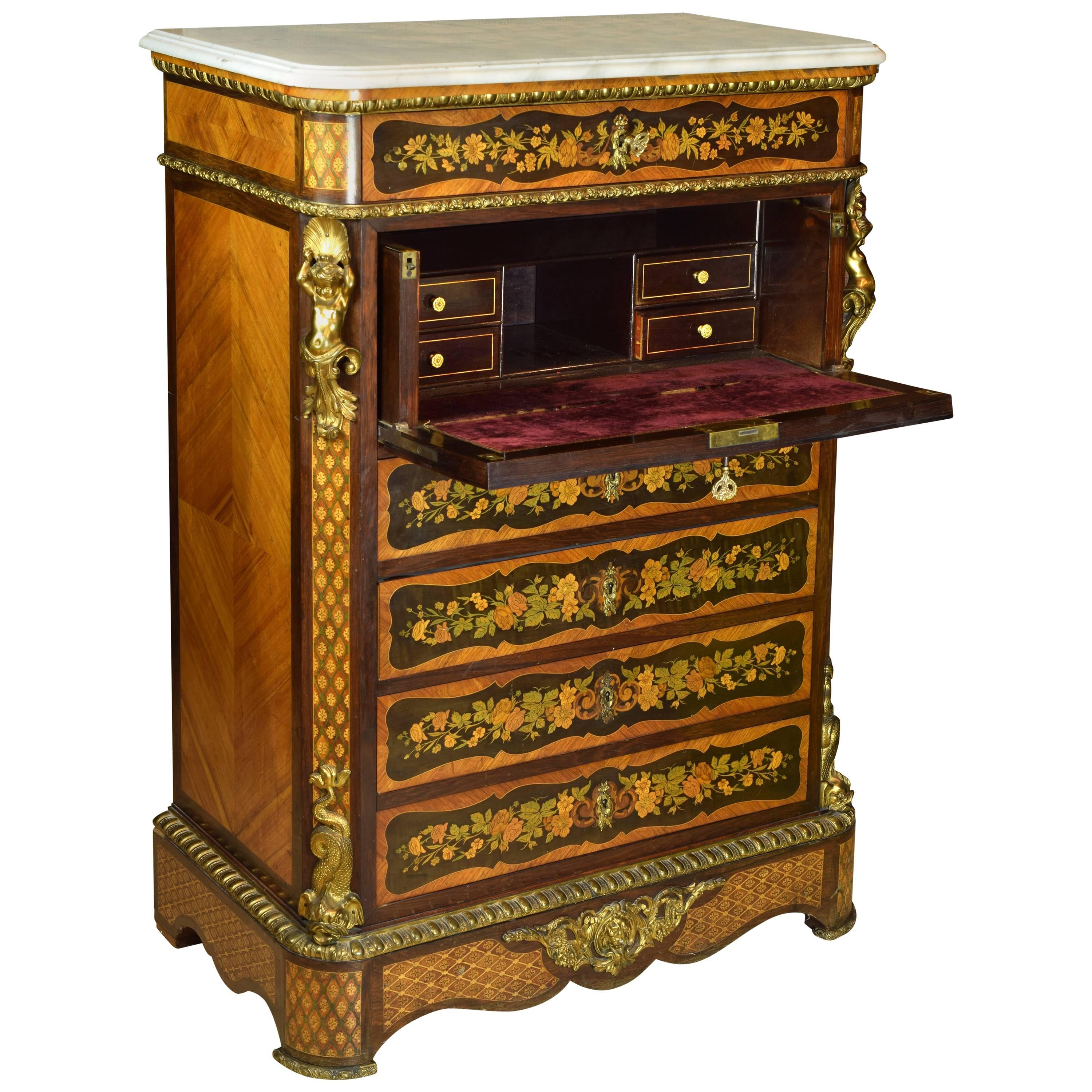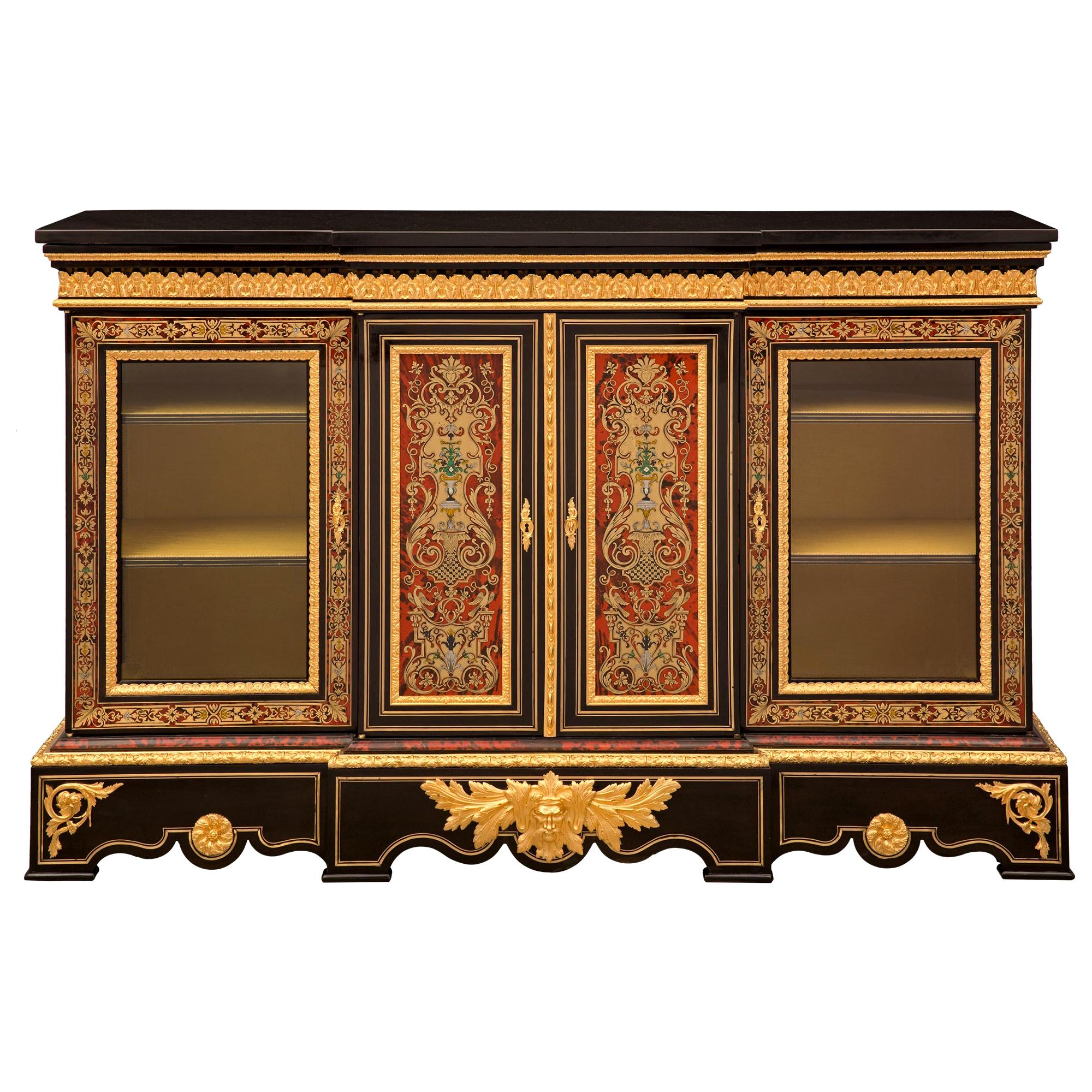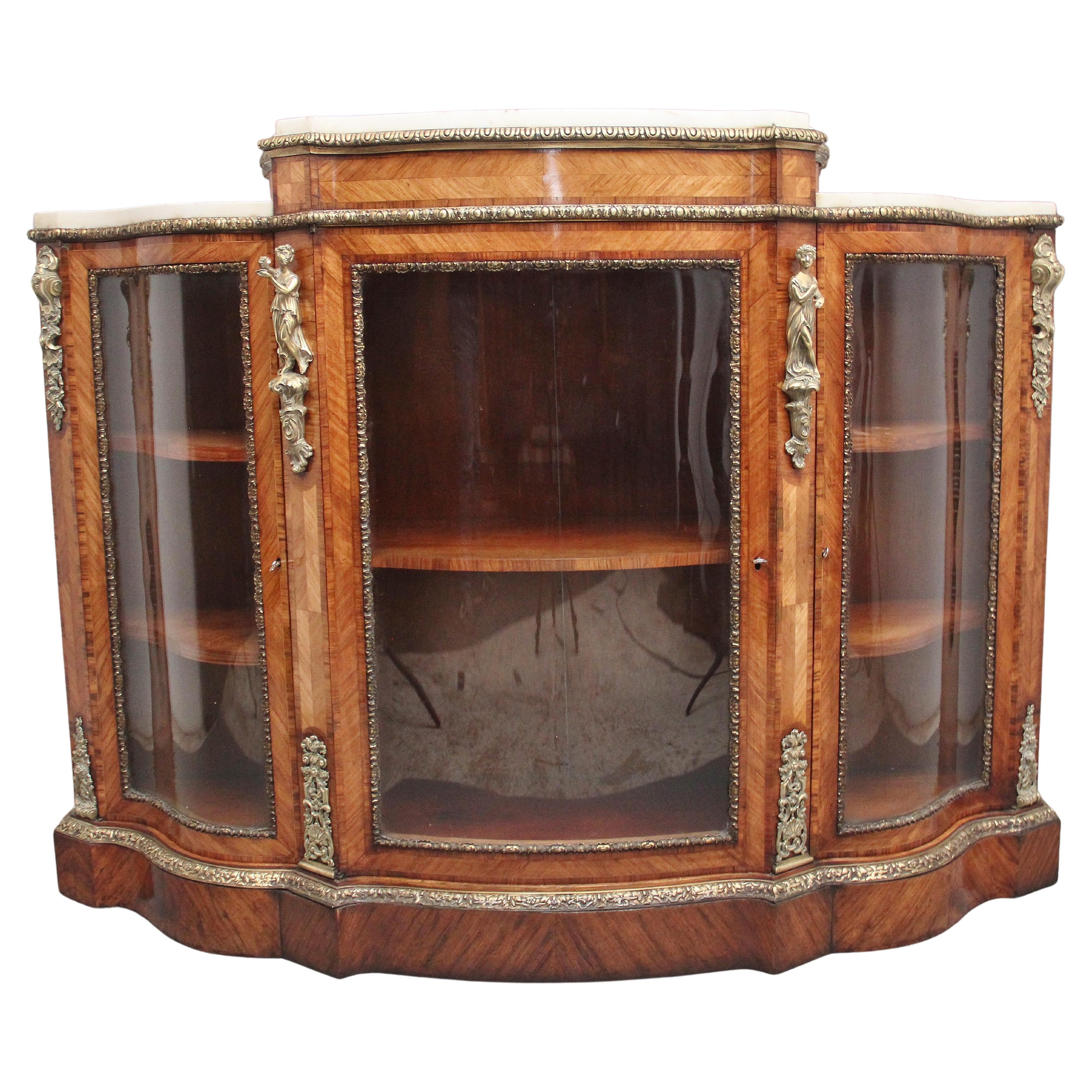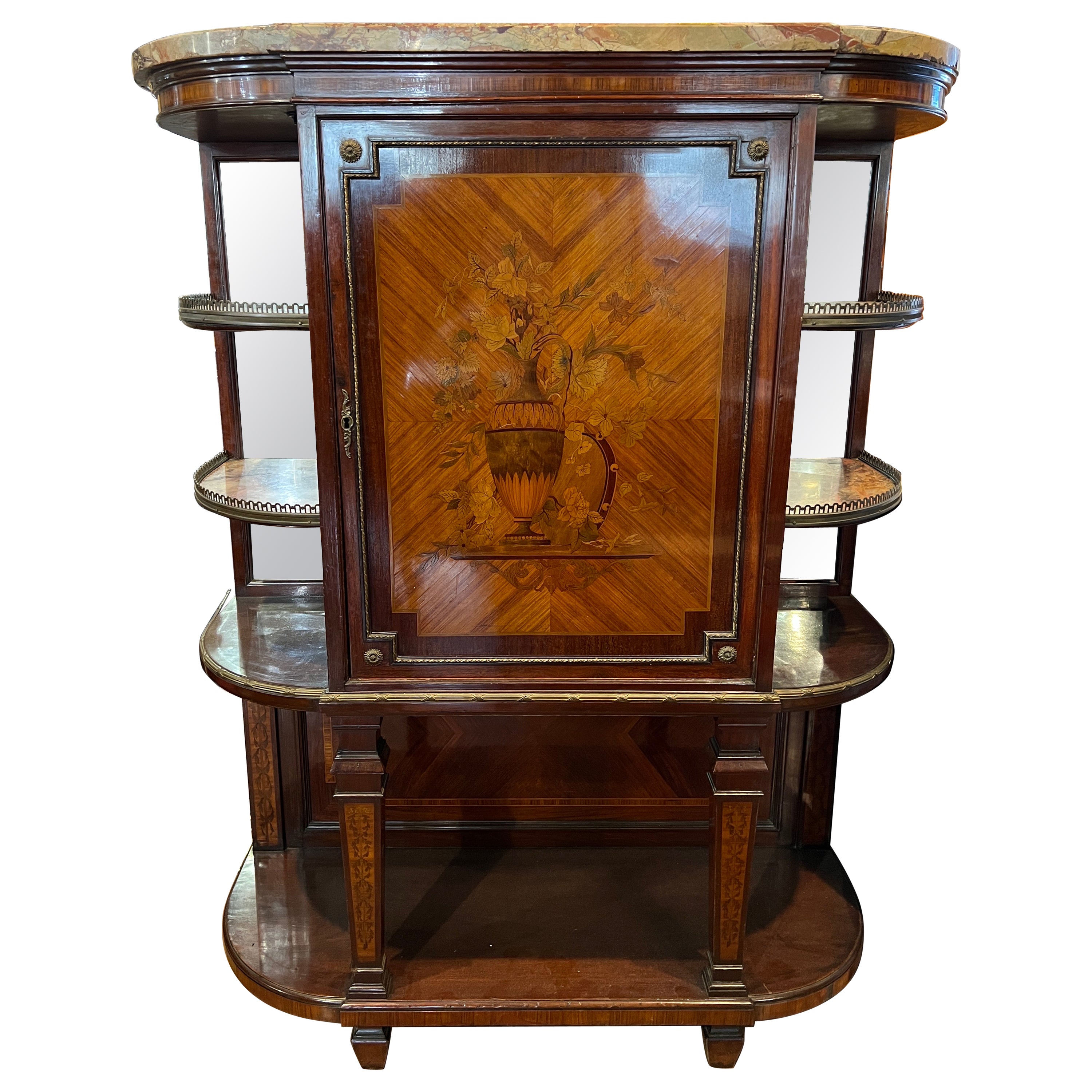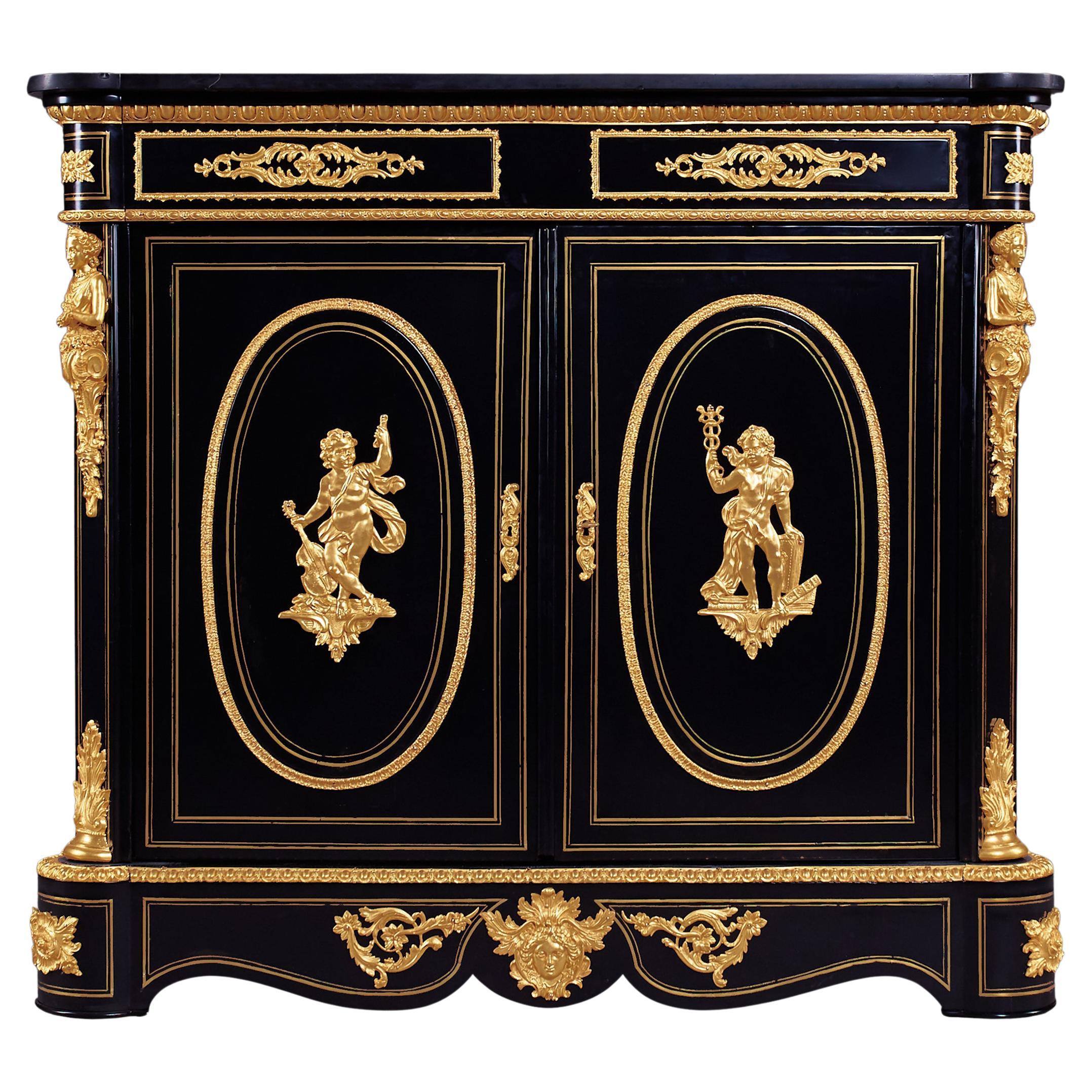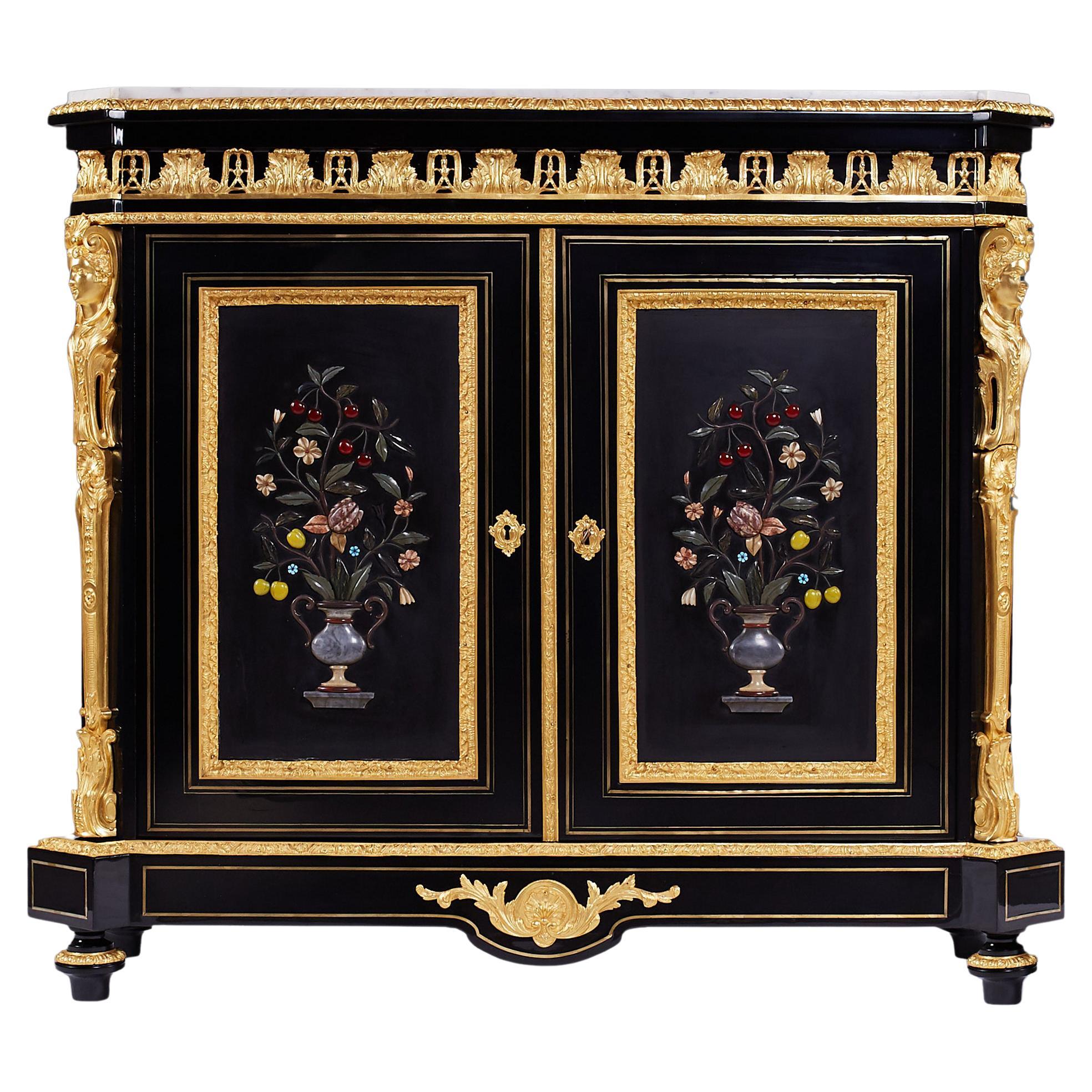Items Similar to 19th Century Napoleon III Kingwood Marble Top Inlay Hippolyte Edme Pretot, 1830s
Want more images or videos?
Request additional images or videos from the seller
1 of 14
19th Century Napoleon III Kingwood Marble Top Inlay Hippolyte Edme Pretot, 1830s
About the Item
Fantastic inlay French Cabinet , signed Hippolyte Edme Pretot (1812-1855) was a Parisian ébéniste (cabinetmaker) know for his high quality furniture and intricate inlays. The cabinet has a shaped top made of white Carrara marble, the body is moved concave on the sides, enriched with a fantastic marquetry of high quality and rare fineness. All embellished with beautifully crafted and chiseled bronzes, just look at the two caryatids supporting the two sides of the central door.
The marquetry is of unique and rare beauty, the central door is adorned with a floral motif scene and set with a riot of bronzes that manage to frame the whole thing like a painting.
Museum piece of furniture.
- Creator:Hippolyte-Edme Pretot (Cabinetmaker)
- Dimensions:Height: 44.89 in (114 cm)Width: 46.07 in (117 cm)Depth: 16.93 in (43 cm)
- Style:Louis XVI (In the Style Of)
- Materials and Techniques:
- Period:
- Date of Manufacture:1840
- Condition:Wear consistent with age and use.
- Seller Location:Roma, IT
- Reference Number:1stDibs: LU3907336122652
About the Seller
5.0
Vetted Seller
These experienced sellers undergo a comprehensive evaluation by our team of in-house experts.
Established in 1963
1stDibs seller since 2018
36 sales on 1stDibs
Typical response time: 1 hour
- ShippingRetrieving quote...Ships From: Roma, Italy
- Return PolicyA return for this item may be initiated within 14 days of delivery.
More From This SellerView All
- 19th Century Napoleon III Credenzas Kingwood Marquetry signed Maison ForestBy Maison ForestLocated in Roma, RMA Fantastic Maison Forest cabinet, signed with stamp on the back, great quality cabinet embellished with very classy bronzes and an inlay worthy of Maison Forest. Furniture that woul...Category
Antique 1880s French Napoleon III Credenzas
MaterialsMarble, Bronze
- 19th Century Charles X Dutch Mahogany Secretaire, 1830sLocated in Roma, RMFantastic Dutch secretaire in mahogany veneer. Rich decoration of inlays with motifs of urns, flower loops and horse carpets. Front with fold-down writing...Category
Antique Mid-19th Century Dutch Charles X Secretaires
MaterialsMahogany
- 19th Century France Napoleon III° Kingwood Gilt Bronze Center TableLocated in Roma, RMCenter table, Napoleon III in purple ebony wood - French provenance,19th century era Four-footed center-leg base surmounted by bronzes depicting putt...Category
Antique 1840s French Napoleon III Center Tables
MaterialsBronze
- 19th Century Louis Philippe French Mantel Clock, 1830sBy C. DetoucheLocated in Roma, RMFantastic and important mantel clock, signed C. Detouche Bte, 160 Rue. St Martin. Paris, France, circa 1830-1835. Constantin-Louis Detouche (1810-1889) born in Paris on 10th Octob...Category
Antique 1830s French Louis Philippe Mantel Clocks
MaterialsBronze
- 19th Century William IV Wood Mahogany Bookcase Secretaire, 1830sLocated in Roma, RMIrish bookcase in mahogany and mahogany feather, with carved capitals on the uprights of the doors, central flap drawer with internal drawers. Furniture of extreme beauty and proport...Category
Antique 1830s Irish William IV Bookcases
MaterialsMahogany
- 19th Century Biedermeier Birchwood Sweden Secretaire and Armoires , 1830sLocated in Roma, RMRare Biedermeier furniture, seeing it looks like a small cabinet, opening the doors we are on the right side a small, elegant, Secretaire, while on the left side a small wardrobe. Sm...Category
Antique 1830s Swedish Biedermeier Secretaires
MaterialsBirch
You May Also Like
- Secretaire "À Abattant" Signed Hyppolyte-Edme Pretot, Paris, 19th CenturyBy Hippolyte-Edme PretotLocated in Madrid, ESSecretaire "à abattant". Fine woods, marquetry, interior with drawers in rosewood and textile, gilded bronze and enameled porcelain; on marble. Signed HYPPOLYTE-EDME PRETOT (Paris, 1...Category
Antique 19th Century French Neoclassical Secretaires
MaterialsBronze
- French 19th Century Napoleon III Period Vitrine Cabinet, Signed PretotBy Hippolyte-Edme PretotLocated in West Palm Beach, FLA stunning and most unique French 19th century Napoleon III Period ebony, ormolu, tortoiseshell, brass, pewter, Lapis Lazuli, mother of pearl, and black Belgian marble vitrine cabinet, signed Pretot. The four door buffet is raised by a beautiful scalloped shaped base with most elegant scrolled movements. The base is adorned with striking richly chased ormolu mounts of lovely rosettes, foliate Rinceaux designs, and a most impressive central mask of a bearded man amidst large acanthus leaves, all set on an ebony background with fine brass fillets. The two central doors are decorated with stunning masterfully executed scrolled foliate brass designs with intricately detailed maiden's faces, birds, and central pewter and colorful pietra dura urns above an exceptional lattice design with a Lapis Lazuli background and a bottom mother of pearl palmette all set on a superb tortoiseshell background. Each outer door retains its original glass pane set within a foliate ormolu band and a sensational inlaid frame with additional brass designs of interlocking geometric patterns, lovely scrolled foliate movements, finely detailed palmettes at each corner, and striking most charming pietra dura inlaid floral reserves. All four doors display foliate ormolu keyhole escutcheons and open to reveal two adjustable upholstered shelves...Category
Antique 19th Century French Napoleon III Vitrines
MaterialsLapis Lazuli, Belgian Black Marble, Brass, Ormolu, Pewter
- 19th Century Kingwood and marble top credenzaLocated in Martlesham, GB19th Century Kingwood and marble top credenza, the stepped top having the original shaped white marble with decorative engraved ormolu moulding below, the credenza consisting of a la...Category
Antique 1860s British Early Victorian Credenzas
MaterialsMarble, Ormolu
- French 19th Century Napoleon III Period CabinetLocated in Warsaw, PLA magnificent rectangular black 2-door cabinet in Napoleon III style. Large and small details are gilt, bringing antique and luxurious looks. Brass medallions are centrally mounted on each door and also adorn the upper facade of the cabinet. The inside of the cabinet is divided into three horizontal shelves. At the bottom of the cabinet, there is a figure of a woman's mask, decorated with floral motifs, notably acanthus leaves and it is completed on the side with a rich ornamentation of gilded bronzes caryatides. The borders running along the cabinet are all gilt and engraved with beautiful patterns. On the two cabinet doors, there are two big figures encased in an oval border, representing Apollo, the god of music, and Hermes, the messenger of the gods. Both are the son of Zeus, and they are also frequently present in mythological tales about the other. When Hermes was just a toddler, he once left his cradle to steal the cattle of his half-brother Apollo. Apollo soon discovered that his flock was missing and began to search the surrounding area. Of course, Apollo was the god of prophecy, so he soon found out about the thief and furiously went to Mount Cyllene to find Hermes in his cave. He grabbed the infant and took him to Mount Olympus, to be judged by their master Zeus, the king of the gods. In front of Zeus, Hermes initially denied everything, but in the end, he had to confess. Zeus found the story quite amusing, so he did not punish Hermes, but only required him to return the flock. Hermes regretted what he had done and offered Apollo his lyre as a gift. The lyre was a musical instrument that Hermes had created all by himself from the shell of a turtle. To repay Hermes for his kindness, Apollo returned the gesture by giving Hermes a golden staff...Category
Antique 19th Century French Napoleon III Cabinets
MaterialsMarble, Bronze
- French 19th Century Napoleon III Period CabinetLocated in Warsaw, PLFrench bronze-mounted Ebonized and Pietra Dura cabinet Empire style ormolu and Pietra dura cabinet from 19th c. Napoleon III ormolu veneered eb...Category
Antique 19th Century French Napoleon III Cabinets
MaterialsMarble, Bronze
- Cabinet 19th Century, Napoleon III Period, Style BoulleLocated in Warsaw, PLThis Napoleon III Style cabinet is made of black polished wood, mounted with gilt bronze, inlaid with brass and resting on top is a plate of Belgian black marble. The Napoleon III st...Category
Antique 19th Century French Napoleon III Cabinets
MaterialsBronze
Recently Viewed
View AllMore Ways To Browse
French Modernist Credenza
Stanley Furniture Rosewood
Asian Low Credenza
Custom Mid Century Cabinet
Walnut Credenza With Brass Legs
90 Inch Credenza
Small Lacquered Credenza
Long Credenzas Hollywood
Knoll Rosewood Credenza
Vintage Thomasville Credenza
Paul Mccobb Credenza Irwin
White Washed Credenza
Credenzas W Filing Cabinets
Extra Long Credenza
Huge Credenza
Mid Century Side Board Credenza
Negroponte Console
Small Cabinet With Caned Doors
